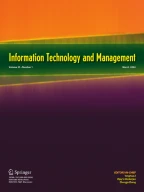Abstract
Web services are gaining popularity for supporting reusable business processes across distributed and heterogeneous environments. Current Web services are understood as taking inputs, executing their internal logic, and delivering outputs. When outputs are delivered, the interaction related to the given service ends. However, in many cases, the delivery of a service does not mean that the business transaction has ended, because there may be a change or cancellation of the original request (from the service requester) or an update of results (from the service provider). Current approaches deal with such scenarios by creating additional operations, thereby arbitrarily splitting the business logic and thus complicating service modeling and execution.
This paper introduces the persistence of services via commitments. Commitments represent agreements between service requesters and providers. The commitments must be fulfilled to ensure successful business transactions. A commitment may last longer than individual episodes of service request and delivery. Operations on commitments, such as create, update, cancel, and discharge, reflect the persistence of the corresponding services and assist in constructing service models and protocols. We show that commitment-enhanced Web service descriptions are simpler and yet more general than current approaches, so that reliable and flexible service compositions can be produced.
Similar content being viewed by others
References
D. Box, A. Skonnard and J. Lam, Essential XML: Beyond Markup, DevelopMentor Series (Addison-Wesley, Boston, 2000).
Business Process Execution Language for Web Services, Version 1.0 (July 2002), www-106.ibm.com/developerworks/webservices/library/ws-bpel.
Business Process Modelling Language (November 2002), www.bpmi.org.
A.K. Chopra and M.P. Singh, Nonmonotonic commitment machines, in: Proceedings of the Autonomous Agents Workshop on Agent Languages and Communication Policies (July 2003).
E. Christensen, F. Curbera, G. Meredith and S. Weerawarana, Web Services Description Language ({WSDL}) 1.1 (2001), www.w3.org/TR/wsdl.
M. Colombetti, A commitment-based approach to agent speech acts and conversations, in: Proceedings of the Autonomous Agents Workshop on Agent Languages and Communication Policies (May 2000) pp. 21–29.
G. Economou, M. Tsvetovat, K. Sycara and M. Paolucci, Implicit commitments through protocol-level semantics, in: Proceedings of the 2nd Workshop on Norms and Institutions in MAS (2001).
N. Fornara and M. Colombetti, Operational specification of a commitment-based agent communication language, in: Proceedings of the 1st International Joint Conference on Autonomous Agents and MultiAgent Systems (AAMAS) (ACM Press, New York, 2002) pp. 535–542.
J. Gray and A. Reuter, Transaction Processing: Concepts and Techniques (Morgan Kaufmann, San Mateo, CA, 1993).
A.K. Jain, M. Aparicio IV and M.P. Singh, Agents for process coherence in virtual enterprises, Communications of the ACM 42(3) (1999) 62–69.
UDDI, UDDI technical white paper (2000), www.uddi.org/pubs/Iru-UDDI-Technical-White-Paper.pdf.
M. Venkatraman and M.P. Singh, Verifying compliance with commitment protocols: Enabling open Web-based multiagent systems, Autonomous Agents and Multi-Agent Systems 2(3) (September 1999) 217–236.
W3C, SOAP version 1.2 (2001), http://www.w3.org/TR/2001/WD-soap12-20010709/.
F. Wan and M.P. Singh, Commitments and causality for multiagent design, in: Proceedings of the 2nd International Joint Conference on Autonomous Agents and MultiAgent Systems (AAMAS) (ACM Press, New York, 2003), to appear.
F. Wan, S.K. Rustogi, J. Xing and M.P. Singh, Multiagent workflow management, in: Proceedings of the IJCAI-99 Workshop on Intelligent Workflow and Process Management: The New Frontier for AI in Business (1999).
Web services architecture usage scenarios (July 2002), www.w3.org/TR/2002/WD-ws-arch-scenarios-20020730.
Web service choreography interface 1.0 (July 2002), wwws.sun.com/software/xml/developers/wsci/wsci-spec-10.pdf.
J. Xing, F. Wan, S.K. Rustogi and M.P. Singh, A commitment-based approach for business process interoperation, IEICE Transactions on Information and Systems, Special issue on Autonomous Decentralized Systems and Systems Assurance E84-D(10) (2001) 1324–1332.
P. Yolum and M.P. Singh, Commitment machines, in: Proceedings of the 8th International Workshop on Agent Theories, Architectures, and Languages (ATAL-01) (Springer, Berlin, 2002) pp. 235–247.
Author information
Authors and Affiliations
Corresponding author
Rights and permissions
About this article
Cite this article
Wan, F., Singh, M.P. Enabling Persistent Web Services via Commitments. Inf Technol Manage 6, 41–60 (2005). https://doi.org/10.1007/s10799-004-7774-3
Issue Date:
DOI: https://doi.org/10.1007/s10799-004-7774-3
